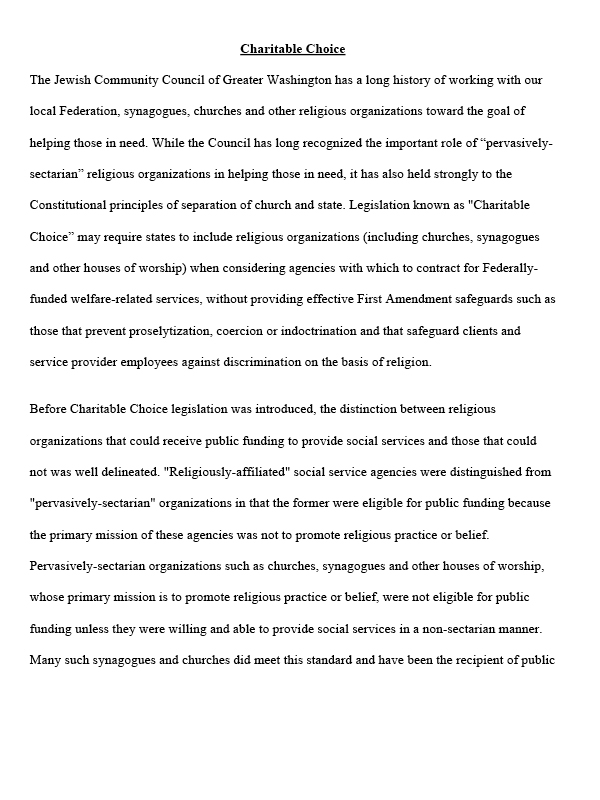Policy Resolution
December 13, 2000
The Jewish Community Council of Greater Washington has a long history of working with our local Federation, synagogues, churches and other religious organizations toward the goal of helping those in need. While the Council has long recognized the important role of “pervasively-sectarian” religious organizations in helping those in need, it has also held strongly to the Constitutional principles of separation of church and state. Legislation known as "Charitable Choice” may require states to include religious organizations (including churches, synagogues and other houses of worship) when considering agencies with which to contract for Federally funded welfare-related services, without providing effective First Amendment safeguards such as those that prevent proselytization, coercion or indoctrination and that safeguard clients and service provider employees against discrimination on the basis of religion.
Before Charitable Choice legislation was introduced, the distinction between religious organizations that could receive public funding to provide social services and those that could not was well delineated. "Religiously-affiliated" social service agencies were distinguished from "pervasively-sectarian" organizations in that the former were eligible for public funding because the primary mission of these agencies was not to promote religious practice or belief. Pervasively-sectarian organizations such as churches, synagogues and other houses of worship, whose primary mission is to promote religious practice or belief, were not eligible for public funding unless they were willing and able to provide social services in a non-sectarian manner. Many such synagogues and churches did meet this standard and have been the recipient of public funds. In addition, an exception existed that permitted religiously-affiliated housing and longterm care facilities, such as nursing homes, receiving public funding to conduct religious activities. It was generally recognized that since these facilities are the only home their clients have, barring the facilities from providing religious services would, in effect, be denying them access to religious worship. Moreover, religious organizations have been granted exemptions from anti-discrimination regulations regarding hiring where having an employee of a particular religion is relevant to that employee's function and the social service program's goals. Thus, Charitable Choice provisions are not necessary to enable these organizations whose primary purpose is to promote religious practice, to provide social services. In many cases, even absent Charitable Choice provisions, "pervasively-sectarian" organizations are permitted to provide publicly-funded services so long as they ensure that the environment and content of these services are non-sectarian. When a church or synagogue prefers to provide services that have a religious content or are provided in a pervasively religious environment, these services should be encouraged and supported from private donations. In addition, these provisions raise serious concerns about the possibility of government entanglement with religious practices and is likely to result in competition among religious groups before elected officials for scarce government funds.
Charitable Choice legislation undermines the historical distinction between "pervasively-sectarian" houses of worship and religiously-affiliated social service agencies that provide nonsectarian services. Requiring states to include pervasively-sectarian organizations as contractors of welfare-related services violates the principle of separation of church and state found in the First Amendment. For example, Charitable Choice provisions allow the pervasively-sectarian organizations to provide these services in a fashion that may be coercive of social service clients, especially in smaller communities where they may not have the option of participating in a program other than one run by an organization affiliated with a religion different from the clients. Charitable Choice provisions generally provide no adequate safeguard against the use of prayer and religious instruction in counseling and other services. This conflicts with our position that people in need should not feel pressured to engage in religious practice when seeking services.
Therefore, the Jewish Community Council:
- Opposes the passage of Charitable Choice legislation.
- Will work in coalition with other organizations to ensure that Charitable Choice provisions are not added to other human service legislation at the Federal and State levels, but in the event that Charitable Choice legislation is passed, will work to insure that appropriate First Amendment safeguards are put in place before such programs are implemented.
- Will educate our community regarding possible dangers of Charitable Choice provisions that violate the First Amendment and also threaten the quality of publicly funded social services.
Adopted by the Board of Directors
December 13, 2000
Document
